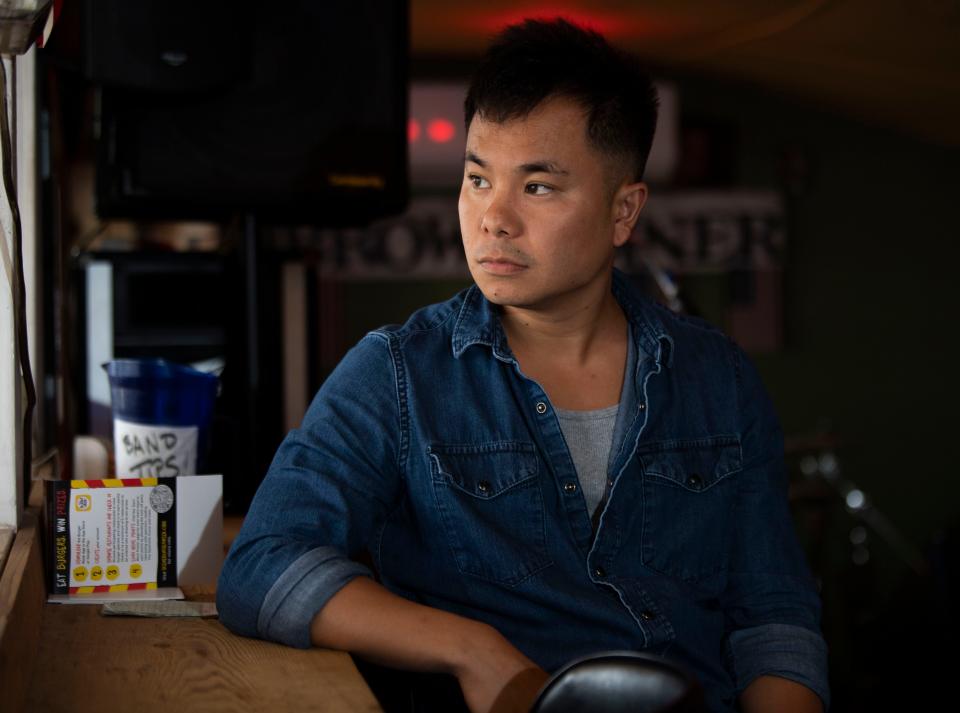Gabe Lee hopes to 'bridge gaps' between divided Americans with new album
Gabe Lee's most significant power as a singer-songwriter traveling through modern America isn't as the writer of 42 critically acclaimed songs released over the past five years.
Instead, as experienced on his new album "Drink the River," it's his work as a sensitive empath who excels at repairing the ties that bind in a nation torn asunder in many ways.
"I'm a son of the South and immigrants who loves reading Southern folklore," says the Nashville-raised Taiwanese-American performer while eating a hamburger at Brown's Diner, a stone's throw from Belmont University in downtown Nashville.
"(Because of my background), I'm aware that the unique authenticity of my music, perspective and voice can bridge gaps between people. Music is a life-defining force for many. So these songs examine how my music can fundamentally and emotionally connect us as people to the hope to survive the despair of difficult times."

What he describes as the "art" of "crafting songs that organically bring about hope" on "Drink the River" evolves into the story of a cancer-stricken wife, an OxyContin addict, people equating hard times to being a ditch-digger and more, as he notes, "difficult times."
These are stories from places far more demonstrably American than the 50-yard-line of Nashville's Nissan Stadium, where Lee's 2022 album "The Hometown Kid" finds the soul-crushing gravitas of a Titans home playoff loss being equated to falling out of love.
Census data from 2020 shows that 76% of Americans live in small towns with fewer than 5,000 residents. Thus, Lee's album track "Merigold" (alluding to Merigold, Mississippi, population 379) — which tells the story of a cancer-stricken wife whom Lee knew — is perhaps the most authentically American song in his catalog. It also reflects where he's grown the strongest as a storyteller. He's more competent than ever at spinning comforting, connective songs from harrowing tales.
In the case of "Merigold," he spins the tale that spawned the song.
He met a widowed husband who along with his wife were longtime online fans of Lee at Merigold's Otherfest, held at an outpost of Hey Joe's, a Mississippi dive bar chain, in October 2022.
Lee's appearance at the event created a communal point of togetherness after the wife had passed.
The song pays tribute to the moment, and when Lee sings about how kudzu grows wild in the South and analogizes it to how cancer grew wild in the man's wife and swiftly took her life, it's a moment for Lee where humanizing tragedy also serves to reduce the discomfort felt by people he feels need to recreate rural to urban and overall, interpersonal connectivity.

Even deeper, a song like "Even Jesus Got the Blues" dives into demystifying the power of the steadfast country and Americana-related singer-songwriter tropes connected to those genres' hyper-religious roots.
Lee grew up a churchgoing bluegrass listener but uses religion in the song to describe how profoundly unknown the amount of love required to fill the depths of someone's sadness can ultimately be.
He offers a sobering thought in its directness that also speaks to the laser-focused scope of his creative lens on his new project.
More music: Lori McKenna, Jelly Roll find lost Nashville songs in new Apple Music program
"At times, life can be a gamble," he says. "Even prayers and thoughts from the strongest people supported by the most powerful ideologies can't overcome life."
He name-checks inspirations like John Prine ("He used his incredible mastery of language to communicate a wide gamut of emotions to his listeners") and current Americana superstar Jason Isbell ("He decompartmentalizes his emotions really well") when asked what more than the oft-maligned "thoughts and prayers" can come from music to help overcome modern American life's crushing impact.
"We need to discover new forms of authentic truth that cut to the (metaphorical) bones of real people," he says. "Beyond living lives defined by sharing Facebook threads, praying about people and hoping things get better, (real-time) communities are developed around people we know, who exist without fabrication, often in despair and pain."
Reflecting on the totality of his well-regarded work of late, Lee makes a blanket statement that best describes what drives his tireless touring and ever-present creative evolution.
"I'm figuring out how to paint pictures with basic human emotions to help get us to be inspired to open our hearts."
This article originally appeared on Nashville Tennessean: Gabe Lee's new album 'Drink the River' hopes to heal America's divide

